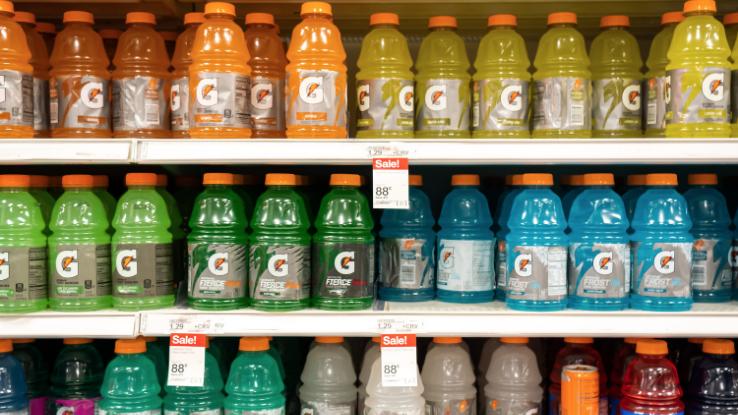What Role Does Utilization Review and Quality Management Play in Employers to Employees Care

Electrolytes are minerals found in blood and other bodily fluids. They are electrically charged and, every bit such, essential to keeping the heart, fretfulness and muscles functioning properly. With this in mind, it'southward of import to maintain a precise and constant balance of electrolytes to stay good for you. The kidneys play an important office in ensuring that fluid and electrolyte levels remain in range despite any changes the body may undergo. Having an backlog — or an insufficiency — of electrolytes in the body can be unsafe and, in some cases, fatal.
What Part Practise Electrolytes Serve?
Ane of the major roles of electrolytes is to ensure that fluid levels inside and outside of all cells in the body are counterbalanced. Fluid levels within individual cells change in response to electrolyte levels. For case, an increase in electrolytes inside a prison cell draws more than fluid in whereas a decrease in electrolytes promotes an outward flow of fluids. Sustaining this type of osmotic gradient is essential for nervus and muscle function, hydration, and maintenance of blood pH levels.

Additionally, electrolytes conduct electric impulses across the jail cell and to neighboring cells in lodge to promote musculus contractions and nerve impulses. The major electrolytes found in the body are calcium, sodium, potassium, phosphate, chloride and magnesium. Private electrolyte levels tin be measured past urine or claret tests.
The normal range of blood levels (called serum values) and individual functions for these electrolytes are:
Calcium: 8.7 to 10 milligrams per deciliter (mg/dL)
- Calcium is the near abundant electrolyte in the body. Calcium is mainly stored in the teeth and bones where it helps to brand them strong. Calcium is as well critical for muscle contraction, nerve signaling, blood clotting and normal heart function.
Sodium: 135 to 145 milliequivalent/liter (mEq/L)
- Sodium is the major cation (positively charged ion) establish outside of the cell. It works to regulate the full amount of water in the torso and plays a significant role in neuronal and nerve signaling.
Potassium: 3.v to v.2 mEq/Fifty
- Potassium is the major cation inside the prison cell. Potassium is essential for proper functioning of the heart, kidneys, muscles, nerves, and digestive system.
Phosphate: two.5 to four.5 mg/dL
- Phosphate, or Phosphorus, makes upward i per centum of a person'southward total trunk weight. A majority of the body'south phosphate is found in the basic and teeth where it promotes their formation. Information technology also plays an important role in the body'due south utilization of carbohydrates and fats. Phosphates are also critical to the synthesis of proteins that promote the growth, maintenance, and repair of cells and tissues.
Chloride: 96 to 106 mEq/L
- Chloride is the major anion (negatively charged ion) establish outside the cell. Chloride plays a disquisitional role in keeping the proper residuum of body fluids and maintaining the body's acid-base of operations remainder.
Magnesium: 1.5 to 2.5 mg/dL
- Magnesium is mainly establish stored in bones or bound to proteins within the bloodstream. Magnesium is active in DNA replication and cardiovascular part; helps maintain normal muscle and nerve role; and keeps bones strong. Magnesium is too involved in metabolic role and tin help regulate blood saccharide levels.
What Is an Electrolyte Imbalance?
An electrolyte imbalance implies either having an excess or a deficiency of electrolytes in the body. The majority of electrolyte-related health problems occur when levels of sodium, potassium or calcium are out of normal range.

Electrolyte imbalances may be caused by:
- Loss of body fluids (e.chiliad. low fluid intake, astringent airsickness, diarrhea, sweating, or high fever)
- Malnutrition or imbalanced diet
- Eating disorders
- Malabsorption, or the disability to blot electrolytes due to a diverseness of gastrointestinal weather
- Hormonal or endocrine disorders
- Kidney affliction
- Some medications, including chemotherapy drugs, diuretics, antibiotics, and corticosteroids all have the potential to impact electrolyte levels
Symptoms of electrolyte imbalances:
- Thirst
- Increased or Irregular middle crush
- Muscle cramping
- Nausea / vomiting
- Diarrhea
- Edema (excess fluid buildup)
- Headache
- Irritability
- Confusion
- Seizure
- Blackout
- Treatments for electrolyte Imbalances, include:
- Intravenous (IV) fluids
- Oral supplementation
- Dietary changes. That is, modest electrolyte imbalances may be remedied with dietary changes. For instance, consuming more potatoes, bananas or avocados will increment potassium levels. Eating more than leafy green vegetables will increase magnesium levels. Increasing intake of celery and yogurt volition increase sodium and calcium levels, respectively.
In order to maintain an electrolyte rest in the torso, information technology is critical to supersede electrolytes lost through sweat or as a consequence of an imbalanced diet. A diet that includes whole grains, leafy greens, and fresh fruits and vegetables typically provides those needed electrolytes. However, depending upon your lifestyle, it is as well important to supplement dietary intake with sports drinks or fruit juices when participating in strenuous activity.
Resources Links:
- "Electrolytes" via MedlinePlus.
- "Electrolyte Test" via National Health Service.
- "The Furnishings of Oral Magnesium Supplementation on Glycemic Response amongst Type two Diabetes Patients" via U.S. National Library of Medicine and National Institutes of Health.
- Capriotti, Theresa and Joan Parker Frizzel. Pathophysiology: Introductory Concepts and Clinical Perspectives. F.A. Davis Company, 2016.
Source: https://www.symptomfind.com/nutrition-supplements/role-of-electrolytes-in-the-body?utm_content=params%3Ao%3D740013%26ad%3DdirN%26qo%3DserpIndex
0 Response to "What Role Does Utilization Review and Quality Management Play in Employers to Employees Care"
Post a Comment